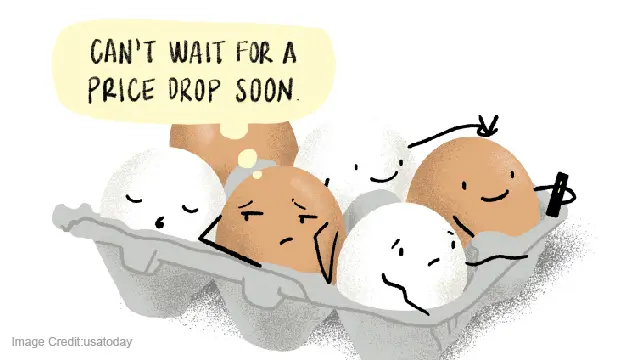Will Egg Prices Drop? Here’s What Experts Say!
Egg prices have been on a wild ride in 2025, leaving many consumers wondering whether costs will finally stabilize. As of March 21, 2025, the national wholesale price for a dozen large eggs in the U.S. stands at $3.27, down from a peak of $8.15 per dozen in February. However, prices at grocery stores remain stubbornly high, with the national average retail price hovering around $4.95 per dozen. (sources: usatoday on eggflation)
With Easter right around the corner—a holiday that significantly increases egg demand—many shoppers are bracing for another price surge. But will prices continue to rise, or is relief on the horizon?
Why Are Egg Prices So High?
Eggs are human daily protein sources, but why are they so expensive? Several factors have contributed to soaring egg prices in recent months:
1. Bird Flu Outbreaks
A major avian influenza outbreak in the U.S. has led to the culling of over 30 million egg-laying hens in 2025 alone. With fewer hens producing eggs, supply has been drastically reduced, forcing prices up.
2. Increased Demand
The demand for eggs spikes every year before Easter, as families buy more eggs for cooking, baking, and decorating. With fewer eggs available due to supply chain issues, this seasonal demand is expected to put further pressure on prices.
3. Import Challenges
To ease shortages, the U.S. has started importing eggs from Europe, but this solution isn’t perfect. Imported eggs must pass strict U.S. safety regulations, leading to delays and limited availability, keeping prices high.
What's more, the U.S. government's international egg hunt now seemed empty handed because of european countries own avian flu outbreaks and the growing domestic demand with the upcoming easter on April 20.
Another biggets obstacle for U.S. to import eggs is two very different systems. The U.S. food safety regulations require fresh eggs to be sanitized and refrigerated before they reach shoppers, while in the European Union, safety standards call for Grade A eggs to be sold unwashed and without extended chilling.( Sourses: US Egg Import obstacles)
Why Have Prices Started Dropping?
While egg prices hit record highs earlier in the year, recent declines suggest that the worst may be over.

Here’s why:
Supply Stabilization: Some farms have recovered from bird flu losses, bringing more hens back into production.
Increased Imports: The government’s push to source eggs from overseas has slightly improved availability. Consumer Pushback: With high prices, some consumers have reduced egg purchases, leading to lower demand and a slight price dip.
However, the decline isn’t uniform across the country—some states are still experiencing higher-than-average prices due to local shortages and supply chain disruptions.
What Experts Predict for Egg Prices
Looking ahead, most agricultural analysts believe egg prices will remain volatile through 2025. According to the U.S. Department of Agriculture (USDA), egg prices are expected to increase by 41.1% this year due to continued supply chain disruptions and lingering effects of the bird flu outbreak.
However, some relief may come after Easter, when seasonal demand declines. If farms continue to recover and imports increase, prices could gradually return to $2.50–$3.50 per dozen by mid-2025.
What Can Consumers Do?
If you’re feeling the impact of high egg prices, here are some practical strategies to save money:
1. Buy in Bulk and Store Eggs Properly
If you have space, consider buying eggs in bulk when prices are lower. Eggs can stay fresh for 3–5 weeks in the refrigerator.
2. Use Egg Substitutes
For baking and cooking, try cheaper alternatives like:
Flaxseed or chia seed “eggs” (1 tbsp ground flax/chia + 3 tbsp water = 1 egg)
Unsweeten Applesauce (¼ cup per egg)
Mashed bananas (¼ cup per egg)
Other egg substitutes - Bake without eggs
3. Compare Prices at Different Stores
Egg prices vary significantly between grocery chains. Check for weekly promotions or consider warehouse stores like Costco or Sam’s Club for better bulk deals.
If you’re looking for the lowest prices, the survey says Trader Joe’s is the winner, averaging $4.86 a dozen and boasting consistent prices across all included major metro areas.
4. Look for Local Farmers’ Markets
Sometimes, local farms offer better deals than supermarkets. Plus, farm-fresh eggs often have higher quality and nutritional value than mass-produced ones.
Final Thoughts
While egg prices have dropped slightly, they remain higher than pre-pandemic levels, and short-term increases around Easter are likely. Experts predict that prices may gradually fall later in the year, but continued avian flu outbreaks and import limitations could keep them elevated.
To avoid overpaying, buy smart, explore alternatives, and stay informed about pricing trends.
Whether you’re prepping for Easter brunch or just trying to make breakfast more affordable, these tips can help you navigate the fluctuating egg market. Would you like to see more money-saving grocery tips?


I love sharing funny Apps or games so as to add joy in your life or enhance your productivity. My goal is to provide clear, actionable insights that make understanding Google Play trends easier and empower creators to succeed in a competitive market.
 More Popular Reports
More Popular Reports
 Instagram
Instagram

 Share
Share


